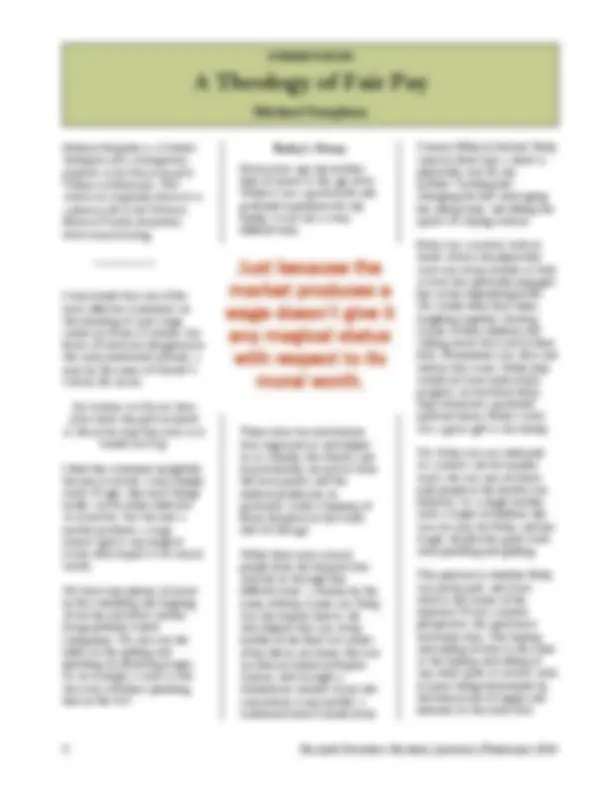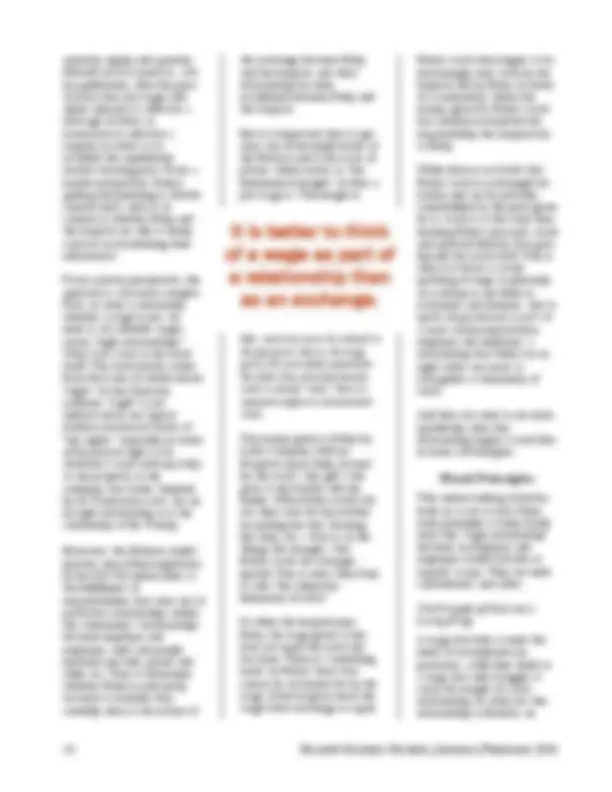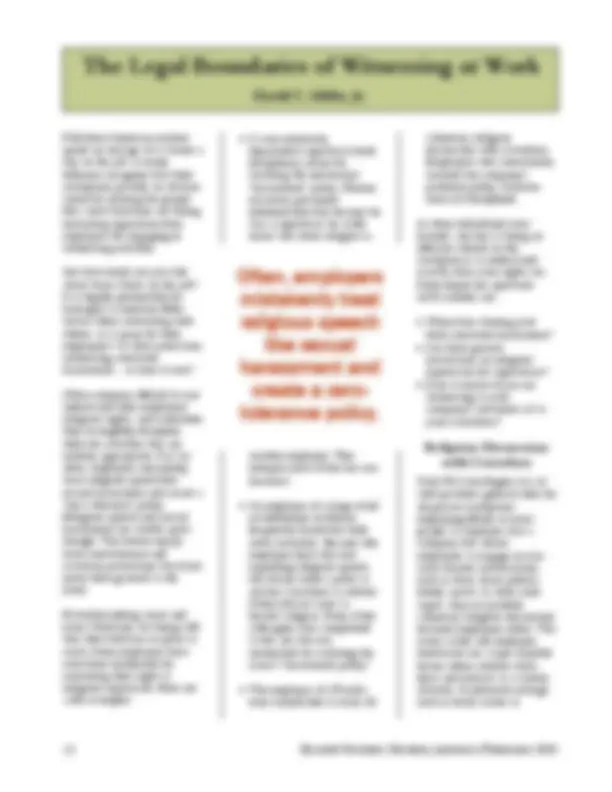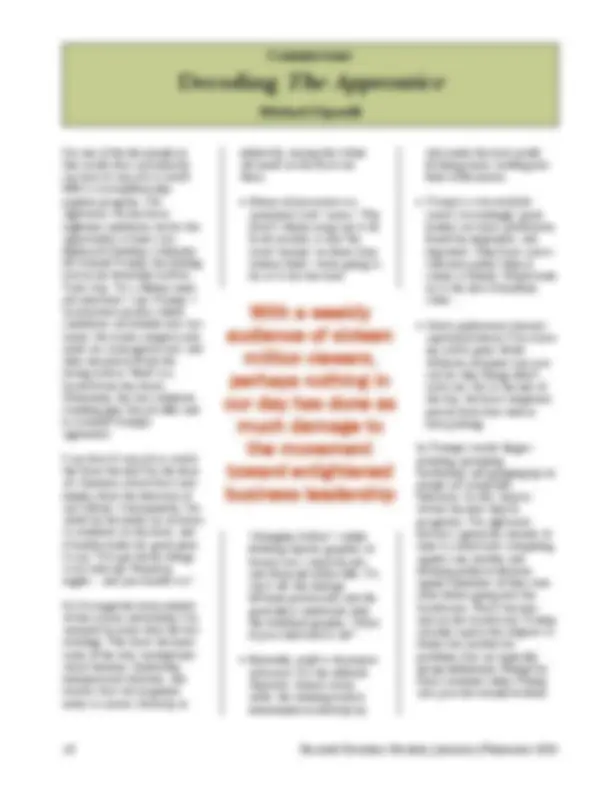













Study with the several resources on Docsity

Earn points by helping other students or get them with a premium plan


Prepare for your exams
Study with the several resources on Docsity

Earn points to download
Earn points by helping other students or get them with a premium plan
Community
Ask the community for help and clear up your study doubts
Discover the best universities in your country according to Docsity users
Free resources
Download our free guides on studying techniques, anxiety management strategies, and thesis advice from Docsity tutors
The relationship between joy, forgiveness, gratitude, and burnout among christian employees. The author identifies four primary catalysts of joy and one major joy killer, burnout, based on a survey of christians. The document also discusses the importance of restoring joy to our lives as a pathway to authentic witness and a closer relationship with god.
Typology: Study notes
1 / 19

This page cannot be seen from the preview
Don't miss anything!












www.regent.edu/review
Issue 15 (January/February 2005)
Restoring Joy to Your Life 3 What’s the difference between joyful Christians and the rest of us? How do they manage to retain a joyful disposition, despite their circumstances? What’s the secret to success here? This study of more than 5, Christians provides some answers you won’t find anywhere else.
O THER VOICES : A Theology of Fair Pay 9 As Christians, how much should we pay people? What’s too little and what’s too much? How should we balance employee needs with the economic realities of the organization? These are not easy questions, but one courageous theologian, who’s also a professor of management, tackles them head-on.
The Legal Boundaries of Witnessing at Work 15 The questions come up regularly among evangelicals and those who employ them. Christian entrepreneurs wrestle with the issue as well. Just what right does one have to share the Good News of the Gospel at work, as an employee or as an employer? The parameters of U.S. law might surprise you.
C OMMENTARY: Decoding The Apprentice 18 The Apprentice is just a TV show, right? Just another one of those insipid, gimmicky attempts by Hollywood to win the ratings war. In reality, though, this “reality show” can shape the reality of how people think about business and how they behave in organizations. Mere entertainment? We think not.
Regent Business Review is an electronic magazine published by the Regent University School of Business. The mission of RBR is “to equip and encourage Christians to be more God-honoring leaders and managers.” As such, we offer practical guidance about what it means to be an authentic Christian in the workplace, as well as tools for better communication, for character development, and for other building blocks of leadership excellence. Driven by a calling to make disciples in the marketplace, we seek to exhort and coach Christians to “excel still more” (1 Thess. 4:1) in their roles as leaders and managers.
We welcome your ideas about how we can make Regent Business Review more useful, and we invite you to tell others about this unique resource. For back issues of RBR, or to subscribe, please visit our Web site (www.regent.edu/review) or contact us at: Regent Business Review, Regent University School of Business, 1000 Regent University Drive, Virginia Beach VA 23464. © 2005 by Michael Zigarelli
people who say they “often” or “always” feel forgiven to those who say they “sometimes” or “rarely” feel forgiven, the average level of joy is more than 25 percent higher. Indeed, feeling genuine forgiveness
from God can open the door to joyful living. Not accepting that forgiveness slams that door in our faces.
This conclusion will come as no surprise to many people of faith. Their personal experience bears poignant testimony to its truth. So, too, do both the Old and New Testaments. In some of the foremost places in Scripture we see that joy is the natural response to God’s forgiveness and to His promise of salvation: In Psalm 51 (“restore me to the joy of your salvation,” v.12), in the Beatitudes (“rejoice and be glad, for great is your reward in heaven,” Matthew 5:12), and in Paul’s letter to the Romans (“be joyful in hope,” Romans 12:12). The assurance and hope of being justified before God is clearly a springboard to jubilation for many Christians. Moreover, this feeling of being forgiven also lays the foundation for a second catalyst for joy: Our forgiveness of other people.
Forgiving Others Builds Our Joy
Christians are clearly called to forgive others, but, as other data from my study indicates, this is the virtue where Christians struggle the most. And when we refuse to forgive, we compromise not only our Christian witness, but some of our ability to live joyfully as well.
As shown in Figure 1 at the end of this article, those who say they are “always” forgiving of others report twice as much joy as those who say they are “never” forgiving. And in between, we see a steady, growing relationship between forgiveness and joy. It seems to be the case that lack of forgiveness embeds in us anger, bitterness, indignation, and resentment—obstacles to our inner peace and our joy. Alternatively, choosing to forgive can remove those encumbrances, paving the way for, among other things, more consistent joy.
Life Purpose Builds Our Joy
A third catalyst for consistent joy is what we might call “life purpose.” People who say that “I feel that my life has real purpose” are much more prone to being joyful than people who do not feel this way, as shown in Figure 2. This is similar to the conclusions of many psychologists who have found through their research that “joy is a pretty certain by- product of goal attainment,” and that “the sense of accomplishment or the achievement of mastery in a game, task, or intellectual pursuit can be a stimulus for
joy.”^3 Feeling that we are doing things that really matter in life—feeling that we are striving for worthwhile ends through our existence—and then making progress toward those ends generates a cheerfulness and elation. By contrast, a feeling of purposelessness, futility, and ineffectiveness inhibits our joy.
Gratitude Builds Our Joy
The last but certainly not least of the catalysts for joy is gratitude. As each one of us has experienced, there is a strong relationship between being thankful and feeling joyful. In my study, I not only found empirical evidence of this linkage, but I also found that the relationship exists because grateful people tend to think differently from the rest of us. Their minds are incessantly focused on what they have rather than what they don’t have. They have disciplined their minds to eschew envy and to reject thoughts about what’s missing
from life—about how much better life could be “if only…” Instead, grateful people are content with what they have and, consequently, they are significantly more joyful than
(^3) See Carroll E. Izard, The Psychology of Emotions, Plenum Press: New York, 1991, pp. 133,
People who are
confident that their
sins have been wipe
clean report a lot
more joy.
When we refuse to
forgive, we
compromise our
ability to live joyfully.
those who experience less gratitude
Figure 3 depicts the connection between gratitude and joy. It’s strikingly linear and steep. Further analysis revealed that there is not just a correlation here, but also a causal connection. Gratitude drives joy. So as we work toward becoming a more grateful person, joyful living often follows naturally.
We should be careful to remember, though, that joy is not guaranteed to follow. Despite the strong causal connection, I identified nearly 1,000 people in my study who are very grateful, but still not very joyful. Digging deeper, I found that these are primarily people who are in their 20s, 30s and 40s—people who are feeling the crunch of over- extension. Learning to be married, the chaos of
parenthood, working to develop their careers, and trying to balance all of these enormous responsibilities can culminate in exhaustion and lack of contentment with life. So, although gratitude often feeds joy, for many people the effects of gratitude may be more than offset by their lifestyle. This segues us nicely
into a discussion of the primary obstacle to joy: Burnout.
Burnout is a joy killer, not only for people in mid-life, but for people of every age. It’s a type of stress, a feeling of exhaustion—usually mental or emotional exhaustion—but it can have physical elements as well like headaches or lack of energy. Sound familiar? It might, because apparently more people than ever are experiencing this condition, often as a result of job or home responsibilities that are simply too demanding. Researchers have also found burnout to be a natural result of excessive interpersonal conflicts, of dealing with other people’s problems all day long, and of receiving few rewards or affirmation for one’s accomplishments. 4
However, these lethargic legions are not all innocent victims. In some cases, we inflict burnout on ourselves. Sometimes we do so by creating what has been called a “performance trap” or “high- performance prison”; 5 that is, we try to excel at absolutely everything we do (whether on
(^4) Representative of this line of research is Cynthia Cordes and Thomas Dougherty, 1993: “A review and an integration of research on job burnout,” Academy of Management Review, 18:4, 621-
(^5) See Robert McGee, The Search for Significance, (Word Publishing,
the job, in our volunteer work, or at home as “super-mom,” “super-dad,” or “super-spouse”) and then, if that were not enough, we continually try to top our last achievement. Our successes are seldom cause for celebration. Instead, they only
serve to raise the bar for next time! We also self-inflict burnout when we allow ourselves to become addicted to over-indulgence—when we repeatedly choose to schedule too many things in our week or when we make a lifestyle out of accumulating and maintaining material possessions. As a result, we never get off the treadmill. We lament the pace of life and we experience its ill- effects, but the irony is that at any time, we have the power to at least reduce the speed of that treadmill, if not step off it entirely. We simply choose not to do so.
And what’s the outcome? Burnout’s consequences are many and menacing: reduced satisfaction with our job and/or our life, lower self- esteem, and what psychologists call “depersonalization”—the mental distancing from the people around us. This is not exactly the portrait of the “fruit of the Spirit” Christian. And the least of the fruit that burnt out Christians do see in themselves is consistent joy. In
People who feel
that their lives have
real purpose are
much more joyful
than are others.
There is a strong
causal relationship
between feeling
grateful and being
joyful
Figure 1 “I Am a Forgiving Person”
Figure 2
“I Feel That My Life Has Real Purpose”
Figure 3
Joy Increases with Gratitude
Figure 4 Burnout Steals Joy
quantity supply and quantity demand are not equal (i.e., not in equilibrium), then the price of labor (the real wage) will adjust upward (to alleviate a shortage of labor) or downward (to alleviate a surplus) in order to re- establish the equilibrium market clearing price. From a market perspective, Ruby’s galling and pinching is of little concern here; what is of concern is whether Ruby and the hospital are able to freely contract in maximizing their self-interest.
From a justice perspective, the question is a bit more complex. First, in order to determine whether a wage is just, we need to ask whether wages create “right relationships.” Why? Let’s look at the word itself. The word justice comes from the Latin ius which means “right.” In the Christian tradition, “right” is not understood in our typical modern situation in terms of “my rights,” especially in terms of my private right to do whatever I want with my body or my property or my company, but rather, inspired by its Trinitarian roots, are we in right relationship as is the community of the Trinity.
Moreover, the Hebrew mišpāt (justice) and şĕdāqâ (righteous) in the Old Testament refer to the fulfillment of responsibilities that arise out of particular relationships within the community—relationships between employer and employee, ruler and people, husband and wife, parent and child, etc. Thus to determine whether Ruby is paid justly, we need to examine very carefully what is the nature of
the exchange between Ruby and the hospital, and what relationship has been established between Ruby and the hospital.
But is it important here to get clear one of the implications of the Hebrew and Latin roots of justice, which serves as “the fundamental insight” of what a just wage is. The insight is
this: work can never be reduced to the pay given; that is, the wage given can never fully account for the labor done, precisely because work is always “more” than its economic output or instrumental value.
The money given to Ruby by Little Company of Mary Hospital cannot fully account for the work—the gift—she gave to my mother and my family. When Ruby works she not only cares for my mother by making her bed, cleaning her body, etc.—that is, in the things she changes—but Ruby’s work also changes herself. This is what John Paul II calls “the subjective dimension of work.”
So when the hospital pays Ruby, the wage given to her does not equal the work she has done. There is “something more” in Ruby’s labor that cannot be accounted for by the wage. If the hospital views the wage/labor exchange as equal,
Ruby’s work then begins to be increasingly seen, both by the hospital and by Ruby, in terms of a commodity, where the money given for Ruby’s work has somehow exhausted the responsibility the hospital has to Ruby.
While there is no doubt that Ruby’s work is exchanged for money and can be partially commodified by the price given for it, work is at the same time forming Ruby’s personal, social and spiritual identity that goes beyond the work itself. This is why it is better to avoid speaking of wage as primarily an exchange as one finds in economics and business, and to speak of pay instead as part of a work relationship between employer and employee, a relationship that when it is in right order can serve to strengthen a community of work.
And here we come to see more specifically what this relationship begins to look like in terms of Principles.
This understanding of justice leads us to see at least three main principles to help clarify what this “right relationship” between an employer and employee would look like as regards to pay. They are need, contribution, and order.
The Principle of Need and a Living Wage
A wage that fails to meet the needs of an employee (in particular, a full-time adult) is a wage that will struggle to carry the weight of a real relationship. In order for this relationship to flourish, an
It is better to think
of a wage as part of
a relationship than
as an exchange.
employer must recognize that employees “surrender” their time and energy and so cannot use it for another purpose.
A living wage, then, is the minimum amount due to every independent wage earner by the mere fact that he is a human being with a life to maintain and a personality to develop.
To get a macro perspective on how well “need” is fulfilled, consider the statistics, illustrated in the form of a champagne glass in the Figure below. Twenty percent of the global population reaps more than eighty percent of the global income. When one thinks that God has given us all dominion—that creation has been gifted to all humanity—but that most of the resources are allocated to a small minority of the population, we have created an economic system that needs to be improved. What becomes less clear is exactly how to improve it.
The Principle of Contribution and an Equitable Wage
While the principle of need is necessary for determining a just wage, alone it is insufficient, since it only accounts for the consumptive needs of employees and does not factor in their productive contributions to the enterprise. Because of effort and sacrifice as well as skill, education, experience, scarcity of talent, and decision-making ability, some employees contribute more to the organization than others, and are “due” more pay. In other words, a living wage, while a minimum floor, is not necessarily an equitable wage.
To honor someone in the wage relationship is to recognize her talents and efforts.
An equitable wage, then, is the contribution of an employee’s productivity and effort within the context of the existing amount of profits and resources of the organization. I have to tell you that the Pope himself runs into this problem of contribution and equity all the time. A
journalist once asked him how many people worked at the Vatican. He paused, and then said “about half.” Jokes aside, as Aquinas noted over 700 years ago, it is a failure of justice when workers are paid the same wages for unequal work, or unequal wages for equal work.
One of the more striking signs of inequity we have seen lately has been the growing wage gap between executive pay and worker wages, particularly in large publicly traded organizations. While some, like Dennis Kozlowski, may justify such compensation numbers, most people realize, especially in our knowledge-based economy, that the economic value of the company is increasingly in the knowledge and skills of all its
employees, and not merely in the executives.
The Principle of Economic Order and a Sustainable Wage
Pay is not only income for the worker, it is also a cost to the employer, which has a significant impact on the economic order of the organization. Without the foresight of how a living and equitable wage will affect the economic order of an organization, a just wage becomes a high-sounding moralism that is impractical. A sustainable wage, then, is the organization’s ability to pay wages that is sustainable for the economic health of the organization as a whole.
These principles, as well as the fundamental insight of justice, will help a manager to realize that there are at least “three bottom lines” to a just wage: (1) needs of all employees, (2) the different contributions of each of the employees, and (3) the economic order of the organization. But the manager of a company will often find these principles in tension with one another and will be tempted to emphasize one or two, but ignore a third.
Let me share with you how one company wrestled with the tensions among these three principles and how they were able to reach a certain synthesis in their compensation policy based on these principles. I must say from the outset that this synthesis is not a static one, but dynamic that can easily be lost, but difficult to regain.
As Aquinas noted
over 700 years ago,
it is a failure of
justice when
workers are paid
equal wages for
unequal work.
Prudence dictated that the living or target wage could not come automatically. The reason the company called it a target wage was that it was something it worked toward. When an employee is hired with no experience and no skills, the company pays the worker the market rate ($7/hour or whatever it is at the time), but then makes a commitment to move that employee to the target or living wage ($11/hour) through training and skill development. So as employees learn the skills and gain experience, which Reell provides, their pay goes up accordingly.
There is more to be said about how Reell’s mission guided its decision-making on wages, but it is important to be clear where the company’s responsibilities lie in light of the Christian social tradition. This tradition, especially as it is articulated in Catholic social teaching, does not hold Reell (or any firm) responsible to pay employees in excess of a sustainable wage (a wage consistent with the sound financial management of the firm), even if that wage falls below a living wage. To do so would unjustly place Reell— and all the firm’s employees— at risk of economic failure. In a market economy, no firm can be obligated to pay without regard to labor costs’ effect on its competitive position, since that would amount to the imprudent choice of self- defeating means. Nevertheless, Reell does have an obligation in justice to create right relationships with employees to work toward a living wage.
This is why Reell can pay less than a living wage, so long as it is working toward correcting the situation through some set of means such as training and skill development.
So what does this mean for those of us who teach? I believe one of the special calls that we have as Christian teachers is to engage our students in a process that moves them from a rather private, therapeutic and achievement-driven notion of work (often described as a “career”) to a richer notion of work infused by a moral and spiritual wisdom (often described as “calling” or “vocation.”) A critical part of this entails helping our students to move from seeing themselves as maximizers of interests to distributors of justice. This is no easy task, since there are elements in our culture that cause businesspeople to bristle at terms like “justice” and “distribution.” Let me explain.
First, businesspeople are often suspicious of the language of “justice,” and for good reason. Justice has become somewhat politicized both within the wider culture and within the church in particular, making it almost unusable in business. Justice can be reduced to a bully club by which the state coerces business to do so-called “good things” or to a prophetic denunciation by which the church condemns business behavior. This has generated a certain reservation among businesspeople, both towards the church and the state. In
this sense, businesspeople have good cause to be suspicious of a stunted notion of justice and its relationship to distribution. Yet, the unfortunate result is that more often than not, businesspeople give up on the language of justice and then do not have a language that can help them personalize their responsibility, as agents of the corporation, to distribute wealth within their own sphere of influence.
Second, businesspeople in general are somewhat apprehensive of the word “distribution.” Influenced by their own education in business and economics, as well as by their own experience, businesspeople will often see wealth distribution best handled as a market decision determined by mechanistic forces of supply and demand. Often, they see no relationship between, on one hand, their decisions, their behavior, and indeed, their growth in virtue, and on the other hand, their fostering a more just distribution of resources. The question of distribution is often relegated to the private sphere of individual giving. Examples like Andrew Carnegie and others tend to be the model, where distribution is promoted not in the business itself but in the charity or foundation of the corporation.
Readers of the Scriptures cannot escape the sense that distributing wealth is an important part of living a life of faith—so important that the Old Testament (see the prophets Jeremiah, Amos, Isaiah) and the New Testament alike (see in particular Mt.
25:31ff. and Lk. 12:16–21; 16:1–13, 19–31) warn that our salvation may be at risk if we fail to distribute the resources within our sphere of influence. Scriptures are abundant with the failure of those who are simply maximers and not distributors.
As Christian teachers, we are called to engage our students to understand themselves as distributors of justice. It is business more so than
government and private foundations that creates and distributes wealth. But if we neglect this call as educators, we ourselves will be under the same judgment given out to the rich man who failed to see Lazarus in his midst.
Michael Naughton, Ph.D., is an associate professor at the University of St. Thomas where he holds a joint appointment in the
theology department and the Graduate School of Business. He is also the director of the John A. Ryan Institute for Catholic Social Thought, which examines Catholic social thought in relationship to business, Catholic education and urban issues. You can reach him at mjnaughton@stthomas.edu
“The Champagne Glass”
The Distribution of Global Income, in Quintiles
hallways, and at times when workers voluntarily interact about non-work issues, employees may discuss their religious views or voluntarily pray together. The same rules apply as would to any other private conversation.
Other employees may not stop religious exchanges simply because they overhear a religious conversation. For example, at a large retail store in Indiana, an employee and several coworkers met informally and as privately as possible each day for a brief word of prayer before clocking in for work. They asked God to bless their supervisors and colleagues and prayed for other needs. One day, company management asked the group to stop because another employee had been offended when she saw them quietly praying. The employee contacted Christian attorneys who informed store management that another worker’s offense at this quiet religious activity did not justify prohibiting it. If the workers had been discussing the previous night’s TV programming, no question would have been raised.
Despite clear legal protections, Christian employees often face discipline for sharing their faith. Incredibly, some employers will allow non- Christian religious expression yet forbid religious expression from Christians. For example, an employee was disciplined for sharing his Christian perspective on suicide and salvation with a coworker who had just expressed his belief in reincarnation and stated that he was contemplating suicide. The Christian was fired for sharing the hope of life found in Jesus Christ and for pleading with his coworker not to commit suicide!
While Christian employees have broad rights to express their faith to coworkers, there are two legal limitations.
(copies of which he always kept at home) when management insisted the employee was not a victim of religious discrimination, but rather was being disciplined for poor work performance.
not to talk about religion walks into the room, your conversation with others must stop. But, you should be sure not to direct the religious conversation to the employee who has objected. Religious conversations at work should take place privately and voluntarily. In
Any employer may
restrict employees
from conversing
about religion with
clients, patients, or
customers…
…but there are no
limitations on a
Christian
employer’s right to
witness to his
customers.
fact, it may be wise to take a conversation elsewhere when a person who has objected comes on the scene, since this type of person would be most likely to press the issue.
Although nothing prevents Christians from discussing faith with coworkers during free time on the job, any employer—public or private— may restrict employee conversations with clients, patients or customers about religion. On the other hand, a business owner may also choose to permit such religious conversations—and many do. The decision regarding religious conversations with clients rests with the private employer and not with the employee.
We recently handled a case in which a California employer terminated an employee for engaging in a religious conversation with a client. The employee had inquired about a mutual acquaintance who happened to be a pastor. The client shared how the pastor encouraged her and her children to attend church and how excited she was to have her children learning about the Bible. A coworker reported this completely voluntary conversation to a supervisor, who fired the Christian. This termination was unlawful because the Christian employee had never been instructed not to discuss religion with customers, and because it was
the client who brought religion into the conversation.
There are no limitations concerning the right of a Christian employer to witness to his customers. In fact, many Christian employers regularly incorporate witnessing into their business practices. For example, Christian employers may place a gospel tract in outgoing mail and print Bible verses on company invoices, purchase orders or other commercial documents. They may answer the phone with Christian greetings, either on a regular basis or on religious holidays, such as Christmas.
In contrast to the relatively unfettered right Christian employers have to share their faith with customers, federal and state laws restrict the rights of Christian business owners to witness to their employees. Under Title VII, business owners or supervisors are permitted to communicate their religious beliefs through their company policies and practices provided that 1) they do not give prospective or current employees the perception that employment or advancement requires workers to adopt a certain religious belief, 2) they accommodate employee objections, and 3) they do not require employees to participate in religious worship experiences. In other words, an employer or supervisor may witness to employees as long as he is careful to accommodate
employees who object to any of the company’s religious practices, and as long as employees are clearly informed that their religious beliefs or non-beliefs play no role in hiring, termination, promotion, or in the terms, conditions or privileges of employment. (However, religious organizations, such as churches and other ministries, are generally exempt from Title VII and state law religious requirements.)
As the above examples show, there is growing hostility in modern America to religious speech at work. Despite some employers’ desire to create a “religion free workplace,” Christians have the right to witness in the workplace— subject to certain limitations. If you face difficulties for sharing your faith in the workplace, contact a Christian attorney who specializes in religious discrimination. This person can provide information regarding your rights and assist you if you are disciplined or terminated for sharing your faith at work.
David Gibbs is the president of the Christian Law Association, an organization that has provided free legal assistance to thousands of workplace believers. For more information about the legal missionary ministry of the CLA, please call (727) 399-8300 or visit www.ChristianLaw.org
and you risk committing suicide.
Now, in fairness, the show does champion creativity, quick thinking, resourcefulness, and good stewardship—values that we cheer. But those values are eclipsed by the show’s stereotyped view of what business is all about, of what it takes to succeed, and of what constitutes “success” in the first place. Given its audience of sixteen million viewers per week (and forty million for last year’s final episode), perhaps nothing in our day has done as much damage to the movement toward enlightened business leadership.
That enlightened view, showcased in non-Trump corporations like Southwest Airlines, ServiceMaster, Men’s Wearhouse, Mary Kay, Chick- fil-A, The SAS Institute, AES, and countless others, entails conceptualizing profit as a means, not an end in business. It views the corporation as
having a broad social responsibility to all stakeholders—as an agent of good in this world, as a tool that exists to improve people’s lives.
That enlightened view entails management by humility and servanthood, not by fear and intimidation. It prefers people to profits, relationship to rivalry, grace to greed, and often—newsflash, Mr. Trump—forgiveness to firing.
Moreover, when it comes to defining “personal success”— the show’s darkest hour—an alternative view is that success is uncorrelated with money or possessions. One would think that we would no longer need to make such axiomatic statements, but clearly we do. They’re not getting through to many of the culture-shapers of our day.
And for Christians in leadership positions—as well as Christians throughout the
workforce—there’s one final take-away from The Apprentice. We too should strive to be apprentices. Not of Trump, of course, or of any mere mortal for that matter. As Dallas Willard reminds us in The Divine Conspiracy , we are to be apprentices of Jesus, seeing him clearly, surrendering to him daily, emulating him in everything we do.
That’s real success in business and in life. Success in God’s eyes.
Michael Zigarelli is the dean of the Regent University School of Business and the editor of Regent Business Review. You can reach him at michzig@regent.edu
Editorials represent the opinion of the writer only, not necessarily the opinion of the Regent University Board of Trustees.
WANT TO WRITE FOR
R EGENT B USINESS REVIEW?